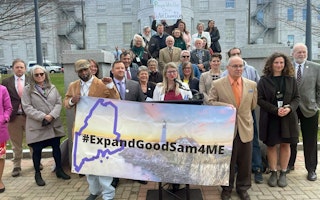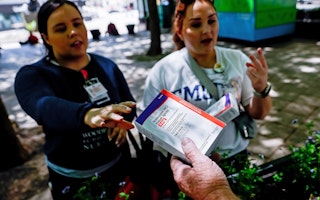Reimagining Drug Policy with Compassion and Justice
By Kasia Malinowska-Sempruch

Open Society believes that drug policy should be rooted in principles of public health, human rights, and upholding human dignity. This belief guides the work I lead as director of advancing global drug policy reform, where we strive to promote humane, evidence-based approaches to drugs and drug use worldwide.
I’ve spent much of my professional life advocating for drug policy reform. For over 30 years, I’ve worked with community organizers, health workers, researchers, national and international policymakers, and—most importantly—people who use drugs. Their stories and insights continue to shape what I believe is possible, a world where people who use drugs are supported rather than criminalized and drug policy is designed with the recognition of complex economic inequalities, social vulnerabilities, and systemic racism.

When we talk about global drug policy, we must ensure that everyone has a seat at the table. That includes countries in the Global South, where the so-called “war on drugs” has had devastating consequences: mass incarceration, state-sanctioned violence, political instability, and public health crises such as HIV. Whether we look at impact of coca or opium eradication in parts of Asia and Latin America, or drug related violence in Mexico and Colombia, we must acknowledge how the policies, often generated and funded by the Global North, have devastated communities in the South.
In the Global North, it is the most economically disadvantaged and marginalized communities that are unable to access evidence-based services, and instead they fill prisons.
This imbalance of power has fueled injustice for decades and we must not only challenge the systems that enable it; we must also center the voices of people who’ve been most affected. Their experience, knowledge, and leadership should drive how drug policy is reimagined and sustained.
At Open Society, we’ve taken this commitment seriously. Our advocacy, along with our partners, has led to significant, hard-won progress.
- In Latin America, we’re supporting efforts to decriminalize personal possession and regulate cannabis and coca markets—an important step toward economic justice for most economically disadvantaged communities of the world, including Indigenous farmers.
- In Asia, we’ve seen momentum toward abolishing the death penalty for drug offenses, with some countries placing moratoria on executions and beginning to review their laws.
- In the United States, a country with one of the highest overdose rates in the world, there are signs of cautious hope. After years of staggering loss, the last two years have brought a significant decline in overdose deaths. That progress is due to work we have been doing at the forefront of harm reduction strategies that prioritize saving lives, including wider availability of naloxone, expanding access to medically-assisted treatment, and more.
- Globally, we advocate at the multilateral level to shift the international drug control regime away from prohibition and toward a health and rights-based commitments.
“This imbalance of power has fueled injustice for decades and we must not only challenge the systems that enable it—we must also center the voices of people who’ve been most affected. Their experience, knowledge, and leadership should drive how drug policy is reimagined and sustained.”
My passion for this work isn’t only professional; it’s deeply personal. I grew up in communist Poland and as a teenager lived through martial law. I came of age in a country where imprisonment was a tool of social control, where families lived in the shadow of state violence—my father spent a decade of his life as a political prisoner. I know firsthand how incarceration fractures families and communities and causes lasting trauma.
And I have seen what’s possible when we invest in supportive services, economic security, and commit to justice. A better, rights-based approach is possible, and we owe it to ourselves to recognize current failures and offer an alternative.

Kasia Malinowska-Sempruch is a director of Programs at the Open Society Foundations.


